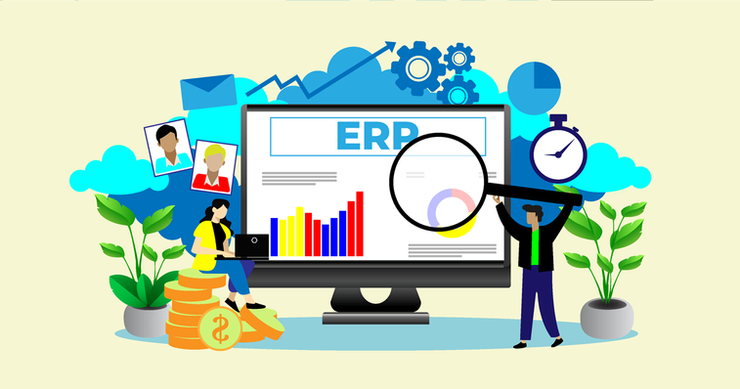1. Strategic Symphony: ERP’s Mastery in Business Operations
In the dynamic rhythm of modern business, Enterprise Resource Planning (ERP) plays the role of a maestro, orchestrating a seamless integration of diverse business functions. Picture ERP as the composer behind the scenes, harmonizing finance, supply chain, and more into a unified platform. This transformative solution is not just an investment; it’s a strategic masterpiece, adapting to the evolving needs of organizations and conducting them toward long-term success.
2. Operational Overture: ERP’s Multifaceted Performance
Efficiency takes center stage with ERP software, redefining how businesses operate. This multifaceted performance automates tasks, from resource management to order processing, accelerating processes and reducing errors. Think of ERP as the conductor directing a symphony of optimized collaboration. It centralizes data, promoting transparency across departments and offering a strategic advantage through insightful analytics. ERP is not just software; it’s the GPS guiding businesses towards a harmonious blend of efficiency, growth, and competitive prowess.
3. HRMS Crescendo: Elevating Human Resource Management
Human Resource Management System (HRMS) takes the spotlight in the HR symphony, orchestrating a symphonic automation of tasks from recruitment to payroll processing. This comprehensive tool not only manages data efficiently but empowers employees through self-service features, creating a positive workplace culture. It’s like a crescendo in talent management, simplifying the challenge of attracting and retaining top talents in today’s competitive market.
4. Harmonic Fusion: The Synchronized Impact of ERP and HRMS Collaboration
Imagine ERP and HRMS as two musicians in perfect harmony, creating a synchronized organizational symphony. Data flows seamlessly, enabling efficient workforce planning and enhancing operational efficiency. This collaboration is more than just the sum of its parts; it ensures compliance and guides organizations toward strategic objectives with precision. The orchestration of ERP and HRMS is the backbone of successful businesses today, creating a harmonious impact that resonates in the dynamic business landscape.
5. Operational Rhapsody: ERP’s Impact on Daily Business
ERP, the unsung hero, brings a silent but powerful revolution to daily operations. Like a musical rhapsody, it automates routine tasks, freeing employees to focus on strategic pursuits. This transformation is not just about efficiency; it’s a journey that positions businesses as leaders in their industries, fostering a culture of innovation and excellence.
6. HRMS Sonata: Crafting Employee Satisfaction
HRMS is the composer crafting a sonata of employee satisfaction. By automating HR processes, it empowers HR professionals to focus on strategic initiatives. The self-service features provide employees with autonomy, creating a positive workplace culture. In a talent-driven market, HRMS is the key to attracting and retaining the best talent, offering a seamless and efficient HR management experience.
7. Symphonic Unity: The Dance of ERP and HRMS in Unison
The integration of ERP and HRMS is a dance, a synchronized movement that results in a harmonious organizational ecosystem. Data flows effortlessly, allowing for efficient workforce planning based on real-time financial insights. This synchronization enhances operational efficiency, ensures compliance, and facilitates strategic decision-making. The collaborative potential of ERP and HRMS is the heartbeat of successful businesses today, creating a symphonic dance that guides organizations toward their goals.
8. Innovation Serenade: ERP’s Impact on Daily Operations
In the symphony of digital transformation, ERP stands as an innovator, silently reshaping daily operations. By automating routine tasks, it liberates employees to direct their energy toward strategic pursuits, amplifying efficiency and fostering a culture of innovation within the organization. This revolution goes beyond mere operational efficiency; it’s a transformative journey positioning businesses as leaders in their industries.
9. HRMS Melody: Shaping a Positive Workplace Culture
HRMS goes beyond data management; it’s a melody shaping a positive workplace culture. Through self-service features, employees gain access to their information effortlessly. This transparency reduces administrative burdens and nurtures a positive workplace culture, leading to happier and more engaged employees. HRMS plays a vital role in attracting and retaining top talent in a talent-driven market, offering a seamless and efficient HR management experience.
10. Symphony of Success: ERP and HRMS in Harmonious Collaboration
Efficiency, innovation, and strategic growth—the collaborative symphony of ERP and HRMS orchestrates success. This harmony enhances operational efficiency, ensures compliance, elevates employee satisfaction, and guides organizations toward their strategic objectives. As businesses navigate the complex terrain of modern commerce, the synergy of ERP and HRMS software emerges as the conductor, leading them to unparalleled success in the dynamic and competitive business landscape.

